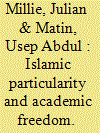| Srl | Item |
| 1 |
ID:
188737


|
|
|
|
|
| Summary/Abstract |
The Indonesian Muslim community includes segments dedicated to contrasting pious projects and doctrinal positions, yet the nation's Ministry of Religion (MORA) manages aspects of Islamic life while purporting to more or less transcend such contrasts. This tension recently emerged in Indonesian public life when a state Islamic university defended the autonomy of its research practices against a challenge by scholars from outside the university who claimed that the doctoral project of Jalaluddin Rakhmat (1949–2021) offended doctrinal positions of the Sunni majority and gave priority to Shiite historiography and doctrine. This dispute shows how questions concerning academic method become disputes about public interest, and further, its resolution attests to the emergence of free inquiry as an Islamic value in the environment of MORA's universities. Academics cited the example of earlier generations of scholars as supporting precedent for an Islamic principle of free inquiry.
|
|
|
|
|
|
|
|
|
|
|
|
|
|
|
|
| 2 |
ID:
141044


|
|
|
|
|
| Summary/Abstract |
Indonesia's state-owned mosques are important sites for observing changes in religious life that have taken place since the demise of the Suharto regime. During the New Order period, ideological and political factors restricted access to mosques owned and managed by provincial and regency governments. In contemporary West Java, access to such mosques has been broadened, and they now display a diversity of religious programs and practices. Drawing on recent fieldwork, this article makes a case study of the intercession ritual known as manakiban which has recently emerged in government-owned mosques of West Java. It identifies two dominant factors behind the new inclusiveness: a desire for visibility and public legitimacy on the part of some members of the Sufi order that promotes the ritual, and secondly, a broadening of access to state-owned mosques as a result of more inclusive participation in the electoral process. The article contributes to knowledge of the politicisation of religion in contemporary Indonesia, and suggests new possibilities for understanding the meanings of public Islamic infrastructure.
|
|
|
|
|
|
|
|
|
|
|
|
|
|
|
|